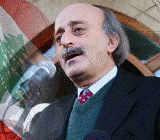Lebanon's disputes are political, not religious - Jumblatt
 Beirut - Lebanon's anti-Syrian Druze leader and head of the progressive Socialist Progressive party, Walid Jumblatt, insists that the conflict between the Lebanese rival factions is based on political, not confessional, grounds.
Beirut - Lebanon's anti-Syrian Druze leader and head of the progressive Socialist Progressive party, Walid Jumblatt, insists that the conflict between the Lebanese rival factions is based on political, not confessional, grounds.
In an exclusive, wide-ranging interview with Deutsche Presse- Agentur dpa, Jumblatt accused what he described as some "Western states and Israel of transforming Lebanon's conflict into a confessional one to benefit from it and thus enhance it like they did in Iraq and Afghanistan."
Jumblatt is a member of the ruling majority group backed by the United States administration, yet those comments appeared to be pointing to the US.
His political grouping is pitted against the opposition led by the Lebanese Shiite movement Hezbollah, the well-armed group backed by Iran and Syria.
The Druze leader ruled out any changes on the Lebanese political arena before the May 2009 parliamentary elections, stressing that all parties will stay with their allies. He also downplayed the possibility of violence.
"We will run in the parliamentary election in a civilized way without using the Lebanese streets," Jumblatt said.
The Lebanese streets have between witnessing daily clashes between followers of the rival groups. The latest was on Sunday night when four people were wounded in Beirut after a clash between members loyal to the opposition and others loyal to the anti-Syrian majority.
Asked if the recent agreement between his group and Hezbollah is aimed at defusing the tension on the streets, or whether it could be described as a new alliance before the elections, the Druze leader said that "during the Doha agreement we agreed to stop the media campaigns and work on easing the tension."
He was referring to the meeting of Lebanese rivals in Doha last May to try to come up with a compromise and stop seven days of bloody battles in Beirut between the Hezbollah-led opposition and groups loyal to the anti-Syrian ruling majority. More than 80 people were killed in the fighting.
Jumblatt, who is known to be an outspoken critic of Syria, also discussed with dpa the possible rapprochement with Syria.
"Now diplomatic ties have been established but some issues like the Lebanese prisoners still held in Syria and the demarcation of borders are still lingering as well as the international tribunal," he said, referring to the group investigating the early-2005 car bomb assassination of former premier Rafik Hariri.
The Druze leader added that establishing diplomatic ties was a long-time demand by the Lebanese since their independence 60 years ago.
Jumblatt's relations with Syria soured after the 2005 assassination of Hariri, during which the Druze leader was the first to accuse Syria and its allies in the killing.
But he stresses that there are deep brotherly relations between the Lebanese people and the Syrians.
On October 15th, the foreign ministers of Syria and Lebanon signed an agreement formalizing diplomatic ties between the two countries for the first time in their turbulent history.
Referring to Syria's recent deployments of thousands of troops on Lebanon's northern border, Jumblatt asserted that the deployment is taking place inside the Syrian territories and "we do not want to interfere in Syrian internal affairs."
Jumblatt stressed that any conflict should be addressed on the national dialogue table which was got started September 16 and will re-convene on November 5. The dialogue is aimed at mending the deep divisions that have recently pushed the country to the brink of civil war.
Among the thorny issues due to be discussed is that of Hezbollah weapons, and how the leaders could adopt a strategy to defend Lebanon based on benefiting from the capabilities of "the resistance," as Hezbollah is known here.
"The issue of Hezbollah arms will be tackled on the national dialogue table under the slogan of a plan for defence strategy," Jumblatt said.
The issue has been a point of disagreement, with many in Lebanon's Western-backed majority wanting to disarm Hezbollah - a demand the group rejects. Hezbollah's weapons became an even more divisive issue after the group used them in last May's street fighting in Beirut. (dpa)